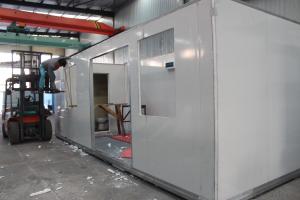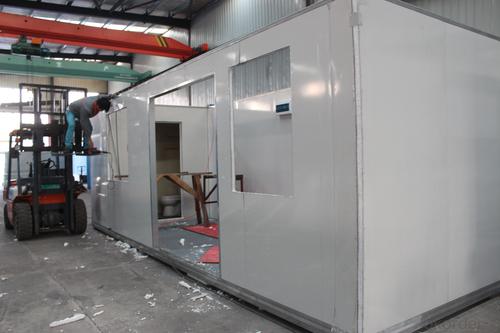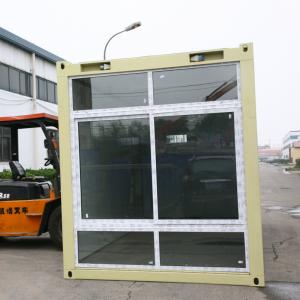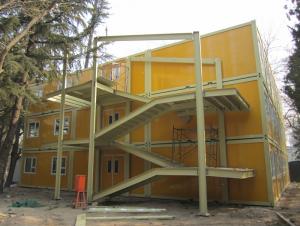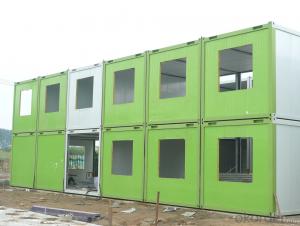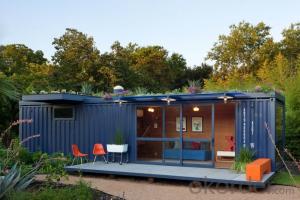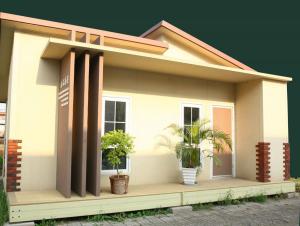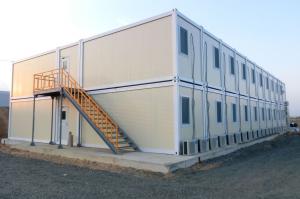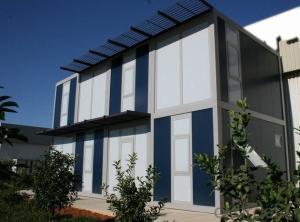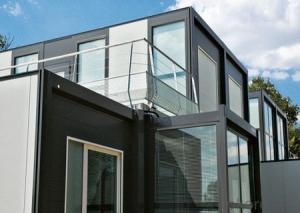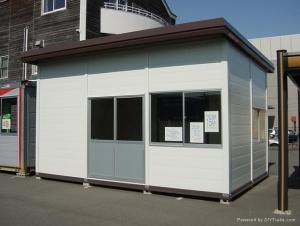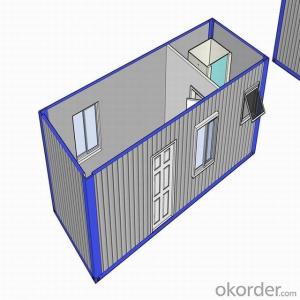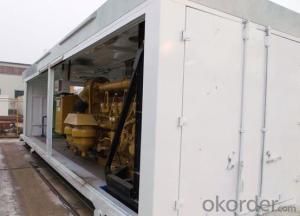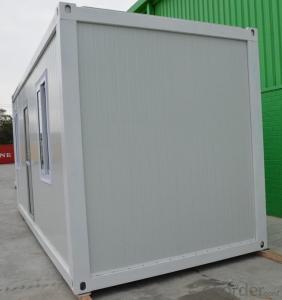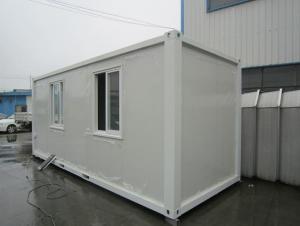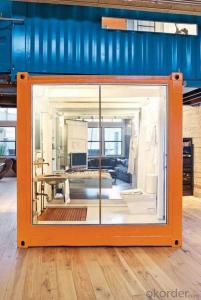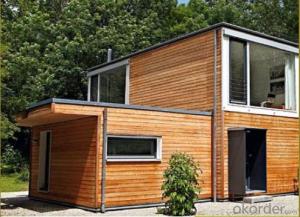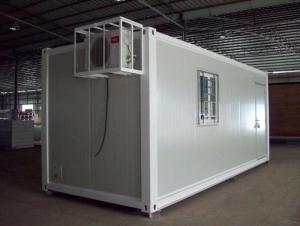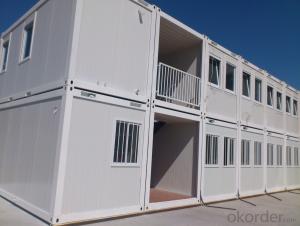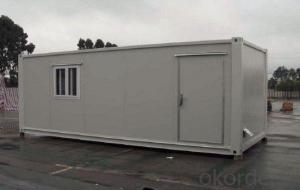Economical container house
- Loading Port:
- China Main Port
- Payment Terms:
- TT OR LC
- Min Order Qty:
- -
- Supply Capability:
- -
OKorder Service Pledge
OKorder Financial Service
You Might Also Like
Our advantages:
1. Qualification: CE(DIN18800), ISO9001, BV
2. Durable, beautiful, economic and environmental
3. High Construction Efficiency (2 worker in one day for one unit)
4. Long life time (Max. 20 years)
5. Easy to transport and assemble (Can load 7 units into one 40'HQ)
Brand Name: PTH
Our advantages:
1) Integrated base and roof, PU injected, excellent strength and tightness
2) 0.426mm color steel sheet for sandwich wall panel, strong and beautiful
3) All electric wires, water pipes, windows, doors and floor pre-setted, easy for assembling
4) Long time oversea project experience
5) 4S sales and service network, buy a house just like to buy a car
| standard | roof load | 0.5KN/sqm (can reinforce the structure as required) |
| Wind speed | designing wind speed: 210km/h (Chinese standard) | |
| seismic resistance | magnitudes 8 | |
| temperature | suitable temperature.-50°C~+50°C |
Usage: The small container house has the following features: light weight, convenient and fast assembling and shipment, many-times disassembling, high rate of reuse. It can be applied to office, command posts, dormitories, meeting rooms, warehouses, shops, additional storey on building roof and temporary houses in the field of building, railways, highways, water conservancy projects, electric power, oil, business, tourism, and military use. And the houses are air-tight, heat-insulating, warm-keeping, waterproof and anti-corrosive.
1. Easy to assemble and disassemble: The houses can be assembled and disassembled for dozens of times and can be reused for many times. And the assembling only needs simple tools and doesn’t need power source. The connections of the pieces of the house all adopt plugs or screw connections.
2. Strong Structure: It adopts steel frame structure, therefore it is stable and in line with the designing code of building structure.
3. Heat-insulation: The roof and wall are made of color steel sandwich panel (EPS, XPS, PU or Rock Wool) which have good heat-insulating and fire-proof performance.
4. Durable: The steel frame parts are all processed with anti-corrosion coating and it can be used as long as 20 years.
5. Environment protection: The design of the house is reasonable and it is easy to assemble and disassemble.
6. Diversified Specifications: Our design can be customized. The doors, windows and front and back walls can be exchanged each other. And the partition walls according to the customers’ requirements.
- Q: Can container houses be designed to have a spacious bathroom?
- Yes, container houses can be designed to have a spacious bathroom. While container homes typically have limited space, clever design and utilization of the available area can create a spacious bathroom. By incorporating innovative storage solutions, efficient layouts, and utilizing the vertical space, container houses can provide a comfortable and roomy bathroom experience.
- Q: Are container houses suitable for areas with limited access to schools?
- Container houses can be a suitable option for areas with limited access to schools. These houses are built using repurposed shipping containers, which are sturdy and easily transportable. Their compact size makes them ideal for areas with limited space, and they can be set up quickly. In areas where schools are scarce or difficult to reach, container houses can provide a solution. These houses can be designed to accommodate families, including children of school-going age. They can be equipped with basic amenities such as electricity, water, and sanitation facilities, ensuring a comfortable living environment for residents. Additionally, container houses can be customized and expanded as needed, allowing for the creation of dedicated spaces for educational purposes. This could include a designated study area or a small classroom within the house. With limited access to schools, these spaces can serve as a temporary solution to ensure children have access to education. Moreover, container houses can be relocated if necessary. This means that if a school is established in the vicinity or if access to schools improves in the future, the container house can be easily moved to a more convenient location. However, it is important to note that container houses alone cannot fully replace the benefits of a traditional school environment. Interaction with peers, specialized teaching resources, and a comprehensive curriculum are crucial aspects of education that may not be fully replicable within a container house. Therefore, while container houses can provide a temporary solution, efforts should still be made to improve access to schools in the long run. Overall, container houses can be a suitable option for areas with limited access to schools, providing a temporary solution and ensuring children have access to education. However, it is important to continually work towards improving educational infrastructure and opportunities for children in such areas.
- Q: Can container houses be built with a rooftop solar panel system?
- Yes, container houses can definitely be built with a rooftop solar panel system. In fact, container houses are known for their flexibility and adaptability, making them an excellent choice for incorporating sustainable energy solutions like rooftop solar panels. The flat roof design of container houses provides a perfect surface for installing solar panels, allowing homeowners to harness solar energy and reduce their reliance on traditional power sources. Additionally, container houses can be easily modified and customized to accommodate the specific requirements of a solar panel system, such as reinforcing the roof structure to support the weight of the panels and ensuring proper wiring and connections. Overall, container houses offer a great opportunity to combine the benefits of sustainable living and renewable energy generation through the installation of rooftop solar panels.
- Q: Are container houses suitable for co-working or shared office spaces?
- Yes, container houses can be suitable for co-working or shared office spaces. These structures are highly versatile and can be easily modified to accommodate different needs. With proper insulation, ventilation, and design, container houses can provide a comfortable and functional workspace for multiple individuals or businesses. Additionally, container houses offer cost-effective and sustainable solutions, which can be particularly beneficial for co-working or shared office spaces looking for affordable and eco-friendly options.
- Q: Are container houses suitable for remote or secluded locations?
- Indeed, container houses prove to be a fitting choice for areas that are distant or isolated. These dwellings have been crafted with ease of transportation in mind, allowing them to be delivered to practically any given spot. The modular aspects of these homes make them especially well-suited to remote regions where conventional building methods may present difficulties or incur high costs. Moreover, container houses boast a robust construction that enables them to withstand extreme weather conditions, rendering them appropriate for secluded locations that experience harsh climates. Furthermore, these houses possess a remarkable degree of adaptability, as they can be extensively customized and engineered to function independently, featuring solar panels, systems for collecting rainwater, and various other sustainable elements. Consequently, container houses serve as an exceptional alternative for individuals or communities who aspire to live off-grid in distant or secluded areas.
- Q: Are container houses suitable for hospitality or hotel accommodations?
- Indeed, hospitality or hotel accommodations can be efficiently provided by container houses. These innovative structures, referred to as shipping container hotels or "cargotels," have become increasingly popular due to their affordability, adaptability, and sustainability. One of the main advantages of container houses in the hospitality sector is their cost-effectiveness. Compared to conventional building materials, shipping containers can be obtained at a relatively low cost, reducing the initial investment required for establishing a hotel. Moreover, their modular design enables easy expansion or relocation, offering flexibility to adapt to changing accommodation demands. Container houses can also be customized and tailored to meet specific hotel requirements. By stacking or arranging the containers in various configurations, unique and visually appealing hotel structures can be created. These containers can be equipped with all the necessary amenities, including bathrooms, bedrooms, air conditioning, and other facilities essential for a comfortable stay. Additionally, container houses contribute to environmental friendliness and sustainability. By repurposing shipping containers, there is a reduced demand for new construction materials, minimizing waste. Furthermore, containers can be retrofitted with energy-efficient systems like solar panels and rainwater harvesting, thus reducing the hotel's carbon footprint. Moreover, container houses provide guests with a distinctive and trendy experience. Many travelers actively seek out exceptional accommodations, and staying in a container hotel offers a memorable and Instagram-worthy experience. This can attract a specific market segment of travelers who desire something unique and sustainable. However, it is crucial to consider certain limitations associated with container houses for hospitality purposes. The size of a single container may limit the number of available rooms, potentially restricting the hotel's capacity. Ensuring adequate insulation and soundproofing is also vital to provide guests with a comfortable and peaceful environment. Additionally, container houses may require additional permits or compliance with zoning regulations, depending on the location. Overall, container houses are a suitable choice for hospitality or hotel accommodations. They offer cost-effectiveness, flexibility, sustainability, and a distinctive guest experience. Despite some limitations, container hotels can prosper in the hospitality industry with careful planning and design.
- Q: Are container houses safe and secure?
- Yes, container houses can be safe and secure. When properly designed and constructed, container houses can offer the same level of safety and security as traditional houses. They are built to withstand extreme weather conditions and can be fortified against potential threats. Additionally, container houses can incorporate various safety features such as fire-resistant materials, secure locks, and alarm systems to enhance security.
- Q: Can container houses be designed to have a low-maintenance exterior?
- Yes, container houses can be designed to have a low-maintenance exterior. Various materials such as metal, concrete, or fiber cement siding can be used to clad the exterior of container houses, which require minimal upkeep. Additionally, incorporating features like durable and weather-resistant finishes, easy-to-clean surfaces, and low-maintenance landscaping can further reduce the maintenance needs of container houses.
- Q: Are container houses suitable for individuals who frequently relocate?
- Container houses are an excellent option for individuals who often move around. The modular and portable nature of these houses makes them perfect for those with a nomadic lifestyle or those who frequently change locations. They are designed to be easily transported and can be moved to different places without much trouble. These houses are constructed using repurposed shipping containers, which are durable and sturdy. They can withstand various weather conditions and can be stacked, making transportation on trucks, trains, or ships easy. This means that individuals can relocate their container house whenever they want to move. Furthermore, container houses can be customized and modified to meet individual needs and preferences. They can easily be expanded or downsized depending on the required space. This flexibility allows individuals to adapt their living space to different locations and accommodate their changing needs. In addition to their mobility and flexibility, container houses are also cost-effective. They generally cost less than traditional houses and require minimal maintenance. The use of shipping containers reduces construction costs, and their durability ensures longevity, reducing the need for repairs or renovations. Container houses also provide sustainability benefits. By repurposing shipping containers, individuals contribute to recycling efforts and reduce the demand for new construction materials. Additionally, container houses can be designed to be eco-friendly, incorporating energy-efficient features and renewable energy sources. To sum up, container houses are highly suitable for individuals who frequently move. Their mobility, flexibility, cost-effectiveness, and sustainability aspects make them an ideal choice for those with a nomadic lifestyle or who need to move frequently.
- Q: Are container houses suitable for student accommodation?
- Yes, container houses can be suitable for student accommodation. They offer several advantages that make them an attractive option for students. Firstly, container houses are affordable compared to traditional housing options, which is important for students who often have limited budgets. They can be purchased or rented at a lower cost, making them a more cost-effective choice. Secondly, container houses are highly customizable and can be converted into comfortable living spaces. With the right modifications, they can offer all the necessary amenities such as bedrooms, bathrooms, kitchens, and study areas. These houses can be designed to maximize space utilization and provide a comfortable living environment for students. Additionally, container houses are portable, allowing for easy relocation if needed. This flexibility is beneficial for students who may need to move frequently, whether it is due to changing universities, internships, or other reasons. Container houses can be transported to different locations, providing a convenient accommodation solution for students. Furthermore, container houses are eco-friendly as they are made from recycled shipping containers. This makes them a sustainable and environmentally conscious choice for student accommodation. With the increasing emphasis on sustainability, container houses align with the values of many students who are concerned about the environment. However, it is important to consider some potential drawbacks as well. Container houses may have limited insulation and may require additional heating or cooling measures. They may also have limited space compared to traditional houses, which could be a concern for students who require more room. Additionally, the availability of land and necessary permits for container houses may vary depending on the location, which could pose a challenge for student accommodation. In conclusion, container houses can be a suitable option for student accommodation due to their affordability, customizability, portability, and eco-friendliness. While there may be some limitations, these houses offer a practical and sustainable solution for students looking for affordable and flexible housing options.
Send your message to us
Economical container house
- Loading Port:
- China Main Port
- Payment Terms:
- TT OR LC
- Min Order Qty:
- -
- Supply Capability:
- -
OKorder Service Pledge
OKorder Financial Service
Similar products
Hot products
Hot Searches
Related keywords
